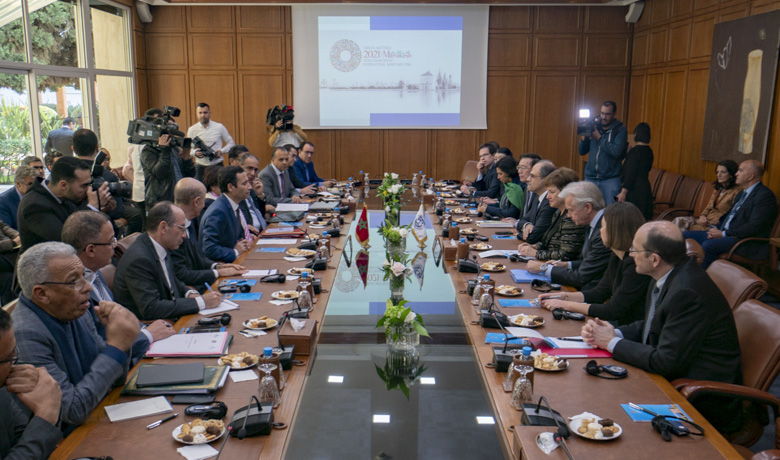
Tax and Customs Administration
IMF's capacity development and analytical activities on tax and customs administration (together often called revenue administration).
The IMF’s tax and customs administration program is designed to support countries in improving their tax and customs administration arrangements based on international good practices. To achieve this, the program focuses on a comprehensive range of issues that includes both management and governance arrangements, and the processes and systems that drive operational performance. In some cases, Medium-Term Revenue Strategies (MTRS) are developed to integrate various technical and governance aspects of tax system reforms.
Our Leadership
-

Debra Adams
Division Chief Revenue Administration Division 1
Asia and the Pacific, Europe, the Middle East, Central Asia and North Africa
-

Margaret Cotton
Deputy Division Chief Revenue Administration 1
-

Andrew Kazora Okello
Deputy Division Chief Revenue Administration 1
-

Andrea Lemgruber
Division Chief Revenue Administration Division 2
Sub-Saharan Africa and Western Hemisphere
-

Andrew Masters
Deputy Division Chief Revenue Administration 2
-

Rebecca Sparkman
Deputy Division Chief Revenue Administration 2
Core Topics
Current Issues
Can’t find what you’re looking for?
Not sure where to start?
Suggested Starter Resources & Training
Core Topics
-
Tax and Customs Administration Management and Governance
This section contains documents that examine management and governance arrangements in tax and customs administrations.
Good management and governance are required both for the control of operational results, and for successfully developing and implementing reform programs. This section also covers other important areas such as risk management, organizational issues, and information technology and data management.
Books
Conferences
Country and Regional Reports
-
Report
-
Report
Republic of Moldova: Technical Assistance Report-Tax Audit Program Diagnostic
-
Report
Republic of the Marshall Islands: Technical Assistance Report-Consumption and Income Tax Reform
-
Report
-
Country and Regional Report
Republic of Armenia: Technical Assistance Report-Tax Compliance and Crypto Assets
-
Country and Regional Report
Libya: Technical Assistance Report-Redesign of Income Tax Forms
-
Country and Regional Report
-
Country and Regional Report
Cambodia: Technical Assistance Report-Training in Investigation Techniques
-
Country and Regional Report
-
Country and Regional Report
Iraq: General Commission for Taxes: Strategic Direction for Prioritized Reforms
-
Country and Regional Report
-
Country and Regional Report
Lebanon: Technical Assistance Report-Tax and Customs Administration: An Urgent Need for Intervention
-
Country and Regional Report
Sri Lanka: Technical Assistance Report-Governance Diagnostic Assessment
-
Country and Regional Report
Central African Republic : Technical Assistance Report-Governance Diagnostic Report
-
Country and Regional Report
-
Country and Regional Report
Republic of Lithuania: Improvement of High Wealth Individuals Control Function
-
Selected Issues
-
Country and Regional Report
-
Country and Regional Report
Cambodia : Technical Assistance Report-Tax Administration Modernization Priorities 2019–23
-
Country and Regional Report
Other Papers
-
Working Paper
Should Tax Be King? The Debate over Tax Priority in Insolvency
-
Working Papers
-
Working Papers
-
Working Papers
-
Technical Note
-
Technical Note
Understanding Artificial Intelligence in Tax and Customs Administration
-
IMF Note
-
Reference Guide
-
Reference Guide
Reform Management Specific Topics: Managing a Reform Program
-
Technical Note
Tax Administration: Essential Analytics for Compliance Risk Management
-
How to Note
How to Implement Electronic Fiscal Reporting (Fiscalization)
-
Staff Discussion Note
-
Note
Developing a Risk-based Compliance Improvement Plan for Customs Administrations
-
How-To Note
-
Regional Note
Customs Administration Strategies for Improved Revenue Mobilization in METAC Countries
-
Note
-
Tax Law Technical Note
The Customs Tariff and the Harmonized System, Interpretation of Tariff Headings, May 2007
Special Series
Speeches
Technical Notes
-
Technical Note
Revenue Authorities and Their Boards of Management Recent Developments
-
Technical Note
Revenue Administration : Developing a Taxpayer Compliance Program
-
Technical Note
-
Technical Note
Use of Technology in Tax Administrations 2: Core Information Technology Systems in Tax Admini
-
Technical Note
Use of Technology in Tax Administrations 3 : Implementing a Commercial-Off-The-Shelf (COTS) Tax System
-
Technical Note
Revenue Administration : Implementing a High-Wealth Individual Compliance Program
-
Technical Note
Revenue Administration : Administering Revenues from Natural Resources - A Short Primer
-
Technical Note
Revenue Administration Reforms in anglophone Africa Since the Early 1990's
-
Technical Note
-
Technical Note
-
Technical Note
-
Technical Note
-
Technical Note
Compliance Risk Management: Developing Compliance Improvement Plans
-
Technical Note
Estimating the Corporate Income Tax Gap : The RA-GAP Methodology
-
Technical Note
Voluntary Disclosure Programs — Design, Principles, and Implementation Considerations
-
Technical Note
Revenue Administration : Performance Measurement in Tax Administration
-
Technical Note
Revenue Administration : Autonomy in Tax Administration and the Revenue Authority Model
-
Technical Note
Revenue Administration : Functionally Organized Tax Administration
-
Technical Note
Revenue Administration : A Toolkit for Implementing a Revenue Authority
-
Technical Note
Compliance Risk Management: Developing Compliance Improvement Plans
-
Technical Note
-
Technical Note
Collecting Taxes During an Economic Crisis : Challenges and Policy Options
-
Technical Note
Tax Administration: Designing a Business Continuity Plan for an Epidemic
Departmental Papers
-
Departmental Paper
Funding the Future: Tax Revenue Mobilization in the Pacific Island Countries
Event Webcasts
Working Papers
-
Working Paper
Citizens' Perceptions of Tax Authorities and Tax Efficiency in Africa
-
Working Paper
-
Working Paper
-
Working Paper
Enhancing Tax Compliance in the Dominican Republic Through Risk-based VAT Invoice Management
-
Working Paper
Raising Tax Revenue: How to Get More from Tax Administrations?
-
Working Paper
State Institutions and Tax Capacity: An Empirical Investigation of Causality (imf.org)
-
Working Paper
-
Working Paper
Tax Administration Reforms in the Caribbean : Challenges, Achievements, and Next Steps (imf.org)
-
Working Paper
-
Working Paper
Political Institutions, State Building, and Tax Capacity : Crossing the Tipping Point (imf.org)
-
Working Paper
-
Working Paper
Current Challenges in Revenue Mobilization - Improving Tax Compliance (imf.org)
-
Working Paper
Managing Income Tax Compliance through Self-Assessment (imf.org)
-
Working Paper
-
Working Paper
-
Working Paper
Case Studies in Tax Revenue Mobilization in Low-Income Countries
-
Working Paper
Revenue Authorities : Issues and Problems in Evaluating their Success (imf.org)
-
Working Paper
-
Working Paper
-
Working Paper
-
Tax Administration
This section covers content related to core functions of tax administrations.
Core functions are the operational activities that must be undertaken for tax administrations to deliver on their mandates effectively. Key functions include taxpayer registration, filing and payment of taxes, refunds, taxpayer services, audit, and dispute resolution.
-
Reference Guide
-
High-Level Summary
-
How-to Note
-
How-to Note
-
Book
-
External Publication
-
External Publication
VAT Fraud and Evasion: What Do We Know and What Can Be Done?
-
Technical Note
Revenue Administration : Taxpayer Audit--Use of Indirect Methods
-
Technical Note
Revenue Administration : Taxpayer Audit--Development of Effective Plans
-
Technical Note
Administering the Value-Added Tax on Imported Digital Services and Low-Value Value Imported Goods
-
Technical Note
Integrating the Collection of Social Insurance Contributions and Personal Income Taxes
-
IMF Conference
-
Tax Law Technical Note
-
Tax Law Technical Note
-
Tax Law Technical Note
Introducing a General Anti-Avoidance Rule (GAAR): Ensuring That a GAAR Achieves Its Purpose
-
Tax Law Technical Note
-
Video
-
Working Paper
-
Working Paper
Taxing Financial Transactions : An Assessment of Administrative Feasibility
-
Customs Administration
This section coverstax and content related to core functions of customs administrations.
Core functions are the operational activities that must be undertaken for customs administrations to deliver on their mandates effectively. Key activities include customs clearance procedures and trade facilitation, cargo management and diversion control, post clearance audit (PCA), and anti-smuggling programs as well as enforcement of customs.
-
Country Report
Islamic Republic of Mauritania: Customs diagnostic and needs assessment mission
-
Technical Note
The Use of Mirror Data by Customs Administrations: From Principles to Practice
-
IMF Event
Customs Workshops on the African Continental Free Trade Area (AfCFTA)
-
Note
Developing a Risk-based Compliance Improvement Plan for Customs Administrations
-
Country report
-
Technical Note
Current Issues
All tax and customs administrations operate in dynamic and multi-dimensional environments and need to be responsive to the changing demands of these environments. To maintain currency and relevance, the IMF tax and customs program is supported by analytical work to identify emerging issues, such as international taxation, gender equality, digitalization, and propose solutions to address associated challenges.
-
Digitalization
This section covers digitalization topics such as use of technology in revenue administration.
By improving the way that revenue administration functions are carried out, digitalization reduces the burden on taxpayers by simplifying procedures and enhancing service delivery, allows for more effective compliance measures through data collection and matching, and improves governance by reducing arbitrary interactions between taxpayers and tax officials. Revenue administrations that have embraced the use of technology have reported improvements in collections and efficiency in operations. At the same time, advances in technology provide both challenges and opportunities in all areas of revenue administration.
-
Blog
-
Report
-
Technical Note
Administering the Value-Added Tax on Imported Digital Services and Low-Value Imported Goods
-
IMF Video
-
Working Paper
Digitalization to Improve Tax Compliance: Evidence from VAT e-Invoicing in Peru (imf.org)
-
Working Paper
-
Publication
-
Publication
-
Publication
-
Publication
-
Publication
-
Publication
-
International Taxation
This section provides access to resources geared at strengthening administrative capacity to manage international tax risks.
Many countries are experiencing challenges in effectively addressing international tax risks. Complex international tax rules, exacerbated by challenges presented by the digital economy, create the need for a comprehensive approach to strengthening revenue administration capacity to manage international tax risks.
-
IMF Note
-
Policy Paper
-
Technical Assistance Report
-
Publication
Fiscal Policy from Pandemic to War, Chapter 2: Coordinating Taxation Across Borders
-
IMF Conference
The Eleventh IMF-Japan High-Level Tax Conference for Asian Countries (virtual)
-
Gender
This section is dedicated to content about gender and revenue administration.
The link between gender equality and the tax system is increasingly a subject of study and research. This section provides links to the Fund’s work that can further discussion on what revenue administration can do to enhance gender responsive taxation. The gender section also includes presentations from the recent webinar of IMF FAD, Introduction to Gender and Revenue Administration. The webinar provided participants with a solid introduction to gender and Revenue Administration issues. Presenters shared insights on IMF FAD’s recent gender work, drawing on the forthcoming technical note, Gender and Revenue Administration – Principles and Practices.
-
Technical Note
-
Note
-
Presentation
-
Online Seminar Program
An Introduction to Gender and Revenue Administration March 2023
-
Online Seminar Summary
An Introduction to Gender and Revenue Administration March 2023
-
Presentation
-
Presentation
-
Presentation
-
Presentation
-
Presentation
Gender equality in Rwanda, and in the Rwanda Revenue Authority
-
Presentation
-
Climate Change
This section is dedicated to content that concerns the administration of various taxes implemented to tackle climate change.
Tax administrations need to be prepared to collect various green and carbon taxes and administer new fiscal programs and incentives that governments are increasingly introducing to reduce the adverse effects of climate change.
-
Article
-
Article
Can’t Find What You’re Looking For?
If you have any questions about the IMF’s work in the revenue domain, please contact us.









